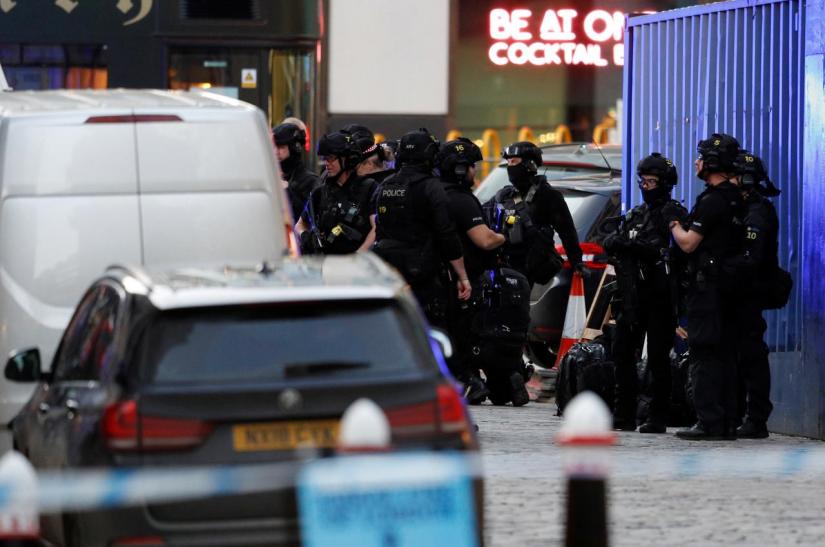 The UK’s police chiefs on Monday opened up their counter-terrorism training module as a free online course for members of the public to create greater vigilance against attacks.
The UK’s police chiefs on Monday opened up their counter-terrorism training module as a free online course for members of the public to create greater vigilance against attacks.
The National Police Chiefs' Council (NPCC) is calling on people to sign up to their “award-winning” eLearning package, called ACT [Action Counters Terrorism] Awareness, which was previously only available to staff working in crowded places like shopping centres and entertainment venues. The NPCC said that while the decision is not a response to the Islamic State (ISIS) claimed terrorist attack at London Bridge on November 29, the knife rampage by Usman Khan that claimed two lives just days ago was a “stark reminder” of the ongoing terror threat faced by the UK.
NPCC Deputy Assistant Commissioner Lucy D’Orsi, Senior National Coordinator for Protective Security, said: “ACT Awareness eLearning is especially useful for anyone working in or regularly visiting crowded places. The course has been so popular, with nine out of 10 users saying they would recommend it, we want to open it up to as many people as possible.
“The threat level remains at Substantial – meaning an attack is likely - so giving everyone the chance to be extra eyes and ears for police and local security teams helps to keep all communities safe. The festive period is obviously a very busy one – so this is a good time to join up and become a CT Citizen.”
ACT Awareness is made up of seven modules that take a few minutes each to complete. Trainees can pause and re-join at any time. In total it takes around 45 minutes, with experts saying it would help to prevent an attack or help save lives if terror was to strike.
The training modules are open to anyone who wants to become a so-called “CT [Counter-Terror] Citizen”, so they can learn how to spot the signs of suspicious behaviour and understand what to do in the event of a major incident. Examples of suspicious activity include taking notes or photos of security arrangements or inspecting CCTV cameras in an unusual way. Others cited are receiving deliveries for unusual items bought online, holding passports or other documents in different names for no obvious reasons or long periods travelling abroad but being vague about where they have gone.
It also includes overt potential terrorist plotting such as buying or storing large amounts of chemicals and hiring large vehicles or similar for no obvious reasons.
The programme was originally devised in partnership with retail giant Marks and Spencer, and participants needed to be signed up by their employers. Now the online learning package will be available free of charge to anyone who wants to take part.
So far around 350,000 people have taken part in the eLearning, from nearly 6,000 registered companies.
 International
International
41360 hour(s) 23 minute(s) ago ;
Morning 03:17 ; Sunday ; Jul 06, 2025
UK police launch public counter-terror training
Send
Aditi Khanna, London
Published : 23:09, Dec 09, 2019 | Updated : 23:11, Dec 09, 2019
Published : 23:09, Dec 09, 2019 | Updated : 23:11, Dec 09, 2019
0 ...0 ...
/hb/
Topics: Top Stories
- KOICA donates medical supplies to BSMMU
- 5 more flights to take back British nationals to London
- Covid19: Rajarbagh, Mohammadpur worst affected
- Momen joins UN solidarity song over COVID-19 combat
- Covid-19: OIC to hold special meeting
- WFP begins food distribution in Cox’s Bazar
- WFP begins food distribution in Cox’s Bazar
- 290 return home to Australia
- Third charter flight for US citizens to return home
- Dhaka proposes to postpone D8 Summit
Unauthorized use of news, image, information, etc published by Bangla Tribune is punishable by copyright law. Appropriate legal steps will be taken by the management against any person or body that infringes those laws.
Bangla Tribune is one of the most revered online newspapers in Bangladesh, due to its reputation of neutral coverage and incisive analysis.
F R Tower, 8/C Panthapath, Shukrabad, Dhaka-1207 | Phone: 58151324; 58151326, Fax: 58151329 | Mob: 01730794527, 01730794528


